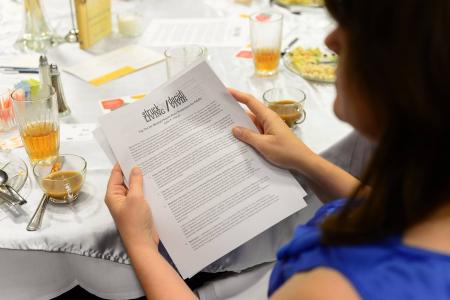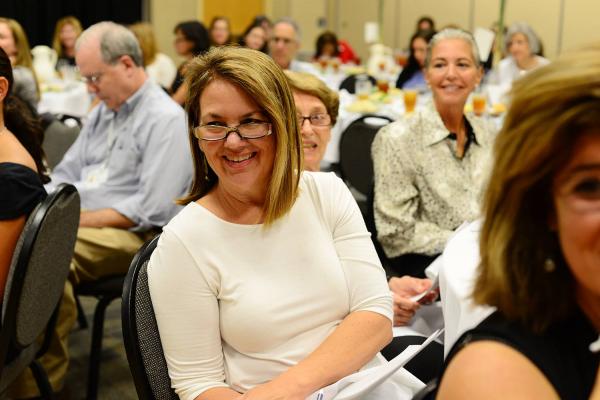New Milestones “Defying Depression” Talk at JCC Austin
I knew it was going to be a magical day when Susan Sager from New Milestones Foundation handed me a handful of silver hearts. "These are milagros," she said, "do you know what this means?" Miracles. I knew the answer to that. If nothing else, the translation of Decidí Vivir has taught me to believe in miracles. Susan explained that the hearts are pockmarked and irregular to symbolize that we are loved even with our imperfections.

Susan Sager from New Milestones Foundation
That day I needed a few miracles. On the plane to Austin, I realized I'd left my speech on the counter in Dallas. That's okay I assured myself, you have it on your IPad. After Val Newberg's kind and generous introduction, I took the stage. My IPad flickered, sputtered, then went blank. Sometimes I get the message loud and clear and this was one of those times. Put away your notes. Speak from the heart.
Luckily my cousin support group was there in full force (David Levy, Arielle Levy, Rebecca Levy, Cheryl Levy and Brooke Hersh-Thompson). David agreed to hold my little Nikon camera to record my speech so we could provide the link for Beverly Scarborough - who worked so hard on this event, but then could not attend due to illness. Thank you again Beverly for all your hard work. Here's the link, David's arm held up for all but about 10 seconds - thank you David!! Defying Depression on YouTube. During the talk I reference the Adult Top Ten, which many of you have seen before.

Attendees discussing the Top Ten for Mental Health
As always, my favorite part of the talk is the Q&A session. What we did differently this time, however, was to write down the questions on index cards, so I had them afterward. The audience was so engaged we could not get to all the questions, so I have answered them all here. For those of you who were there, you'll notice links to various things that I mentioned during the talk. Hopefully this will be a great reference for you.
Have a great week and have a easy fast for all my friends who are observing Yom Kippur
Julie
Questions from the New Milestone Foundation “Defying Depression” Speech – 10/1/14
Note that I am not a psychiatrist or psychologist. These answers are given as my opinions based on my personal experience and reading. Please do not consider this professional advice. If you are experiencing symptoms of mental illness, please consult a professional for guidance.
- How did you begin meditating? Can you give some suggestions of meditation content? I began meditating in earnest, after several failed attempts over a year ago when I accepted the Deepak Chopra/Oprah Winfrey meditation challenge. Offered occasionally for no charge, this program is a series of 21 (the idea is to do one a day for a 21 day period) approximately 15 minute guided meditations. For me this was an excellent way to get in the habit of meditating. From this first experience I have launched my own personal version of meditating. I usually read a chapter of a spiritual text, doing breathing exercises that Swami G (from Dallas) taught me, and then sitting for 10 minutes in silence. Swami G told me that once I could sit for 10 minutes with a clear mind, I would be ready to move to the next step. I still have not gotten there! I notice even with my elementary practice, however, that my day is transformed if I take the time to meditate. I’m calmer, much more able to handle stress. Here are some examples of my favorite texts to read to start my meditation: Jon Kabat Zinn Wherever You Go, There You Are, Thich Nhat Hanh You are Here, Thomas Merton Care of the Soul, Sharon Salzberg Faith, and Martin Laird A Sunlit Absence and John Daido Loori The Art of Just Sitting.
- Is mental health (or discussion of mental illness) more open in Europe? I did not feel qualified to answer this question, as I’ve only lived in London for a year and traveled in Europe –and not with the purpose of seeking out this question. Someone in the audience shouted out “NO!” and told the story of how her grandfather received very poor treatment in Scotland. Again that is one person’s experience. My sense is discussion of mental illness is not as open, but that is true in many parts of the United States as well.
- During the Reagan administration, most mental institutions closed Now where to people go? This is a tough question for which I don’t have a good answer (yet, my hope is with some of the changes in mental health coverage, we will begin to see a solution for this problem). In the 1970s there was a massive effort to close mental institutions because of the poor care in the institutions. Unfortunately no alternative was provided. Now we have many of the mentally ill housed in our prisons (Pete Earley’s book Crazy is an excellent overview of this problem) and on the street, this isn’t a good solution for anyone. I don’t know how to solve the existing problem of those who are severely mentally ill, however, I do believe if we continue to focus all our resources on suicide prevention and the severely mentally ill we will never get ahead of the problem. The more informed people are about brain health protection starting at an early age, the more likely we will be able to self-correct or seek additional help if needed when the problems are small. If we continue to manage mental illness in crisis mode, we will always be in crisis.
- How and when did you first become depressed? My first major depressive episode was my freshman yea, 1979, at the University of Notre Dame (although no one called the episode a "major depressive episode" that at the time). Between a breakup with a boyfriend, a transition in majors, an injury that kept me from running and an intensely gray winter, I spiraled into depression. I plugged through it without the benefit of medication (not much was available at that time, if anything) or counseling (my mother was a counselor, but I don’t think she saw my issues as serious enough to require counseling). I got through it, and did not have a debilitating episode until I was 41.
- What are the “daily care” things you do to stay well? The first five items on the Adult Top Ten are daily care, the rest are stress management.

Someone reviewing the Top Ten for Mental Health
- Do you have experience with Transcranial Magnetic Stimulation (TMS)? I’m very aware of TMS and for the right person it could be a wonderful treatment. I wrote this blog for Psychology Today: TMS or ECT? A Mental Health Consumer Weighs the Options that might be helpful for those considering TMS.
- What suggestions to you have about finding effective treatment? Talk to friends, call the hotline 1-800-873-TALK and a hotline number in Austin was mentioned. My big suggestion here was to make sure you set goals in psychotherapy with a therapist once selected. If you don’t make your goals within the timeframe the two of you have set, it is okay to consult another psychotherapist or psychiatrist. These professionals should have the same standards as other doctors. If you are not seeing results, the treatment may not be right for you.
- Were you on medication when you had your children? I was not, but I have seen an excellent article by the Seleni Institute about this very topic. Here’s the link: http://bit.ly/1rbhjbk
- Do you think depression is similar to treatment for alcoholism? Yes in that depression rarely has a complete “cure.” It is a chronic disease, like alcoholism or diabetes. A person who has had severe depression needs to manage stress and be wary of warning signs.
- Did you have memory loss after ECT? I had short-term memory issues during and about 6 weeks following my last ECT treatment. After that time frame the memory issues seem to have gone away. There were pockets of memory that were lost in the 2-3 weeks before, during and after treatment that I never recovered. Not whole days, but people did visit me in the hospital and I have no recollection of them coming to see me. I consider this a small trade off for the life-saving recovery that ECT provided. Here's another blog I wrote that might be of interest: Memory and ECT
- Psychosis vs depression – Someone once told me that depressives and psychotics are sometimes drawn to each other beasue the depressive often finds the psychotic fascinating. Is this true or false? Why? Is this good? This is one I feel completely unqualified to answer. Interesting question though. If anyone has heard of any research on this, please chime in.
- How do you help someone you love who acknowledges being depressed but refuses to get help? Be consistent and persistent. Enlist the help of family and friends. Also here is a blog that I wrote about this topic. Happens to be the most popular blog I’ve ever written: Convincing the Stubborn to Accept Mental Health Care.
- Do you think mental health is genetic? Think the questioner meant to say mental illness. Yes, definitely. However although some will have a genetic predisposition to mental illness, mental illness is available to anyone who abuses their brain. Deprive anyone of enough sleep, create an emotionally unstable environment, take aware exercise and sunlight – and most people will develop problems. Just like someone can develop heart disease with enough smoking, lack of exercise and stress, someone who abuses their brain can develop mental illness.
- Did you have any negative experience after opening up about your mental health problems? When you were in the “thick of it,” How many people knew you were suffering? Yes I have a few, very few people, who have been jerks to me after I opened up about my depression. Out of the thousands of people who have thanked me for writing my book, I would count less than five people who were mean or unreasonable. That’s a good risk in my book. The jerks were not my good friends, almost all of them were hurting about something else and saw me as a good dumping ground. I’ve learned to not take it personally. While I was depressed I would say our close friends knew, but not everyone. In fact many people were hurt because they thought I was angry at them or didn’t want to be their friend anymore. That wasn’t it, I was just depressed and withdrawing from everyone.

Me signing a book - one of many that was met with thanks
- What type of treatment did you have prior to ECT? How long were you sick before you tried ECT? I tried a long list of medications and nothing worked. Also tried psychotherapy, acupuncture, gave up alcohol, and continued to spiral. After nine months of suicidal depression and three suicide attempts, I had ECT.
- Were you ever ashamed about being mentally ill? I don’t think I was ashamed about being depressed, but was very ashamed that let it get that far out of control. I was deeply ashamed of attempting suicide. Something shifted in the first year after ECT where I realized I could continue being ashamed, or I could live my life forward. When I look back now, it is more in an effort to avoid the same mistakes as opposed to looking back in regret.
- How do you deal with side effects from meds? I do not feel qualified to answer this question. I take a very small amount of medication and have no side effects. However, many people have complained to me about this problem and it is very real.
- With ECT being so successful, why don’t you hear about more people receiving it? Only for those who attempt suicide? ECT has a long history. Some of this history is very negative history that unfortunately continues to haunt the present. SHOCK written by Laryy Tye and Kitty Dukakis provides a great overview of the history of ECT and Dukakis's recovery with ECT. ECT was around before the FDA and before antidepressant medication. In the early use of ECT, people were not given muscle relaxants or anesthesia so it was a terrifying experience. Today it is so much easier and more effective. The patient is under aesthesia, the process is short, and about 80% of patients see a remission of symptoms. I know people who were depressed, but not suicidal who have greatly benefitted from ECT. Confining ECT for only the suicidal is a mistake. At the same time, I would recommend going to a hospital that has a good reputation (research hospitals tend to be more up to date on the latest and best methodology). ECT is constantly being refined and improved. If someone is not responding to medication and deeply depressed, it is an option to consider.
- What are the similarities between Traumatic Brain Injury and Depression? There is a lot of overlap in this area, confusion, sleep disruption, fatigue, negative thoughts – I think it would be very difficult to parse out what is depression and what is TBI. Sometimes people within organizations seem eager to embrace TBI (NFL, veterans) and want nothing to do with depression. I think this is pretty silly. It’s all brain disease. You might as well apply all your knowledge in both areas to the problem.
- What is the best way to cope with days when you have trouble getting out of bed? Get out of bed. Force yourself to move, to talk to people, to change your surroundings. Depression wants you to withdraw, to isolate, to become immobile. If you give into the disease, it will only grow stronger. There is a great video of William Shatner talking about this. Tried to find it but could not. If someone does, let me know!
- Do you feel a medication can stop working. If one drug stops working have you seen success with other drugs? This is frustrating! I have not personally had this experience, but know of plenty of people who have. Consult your psychiatrist, make sure s/he knows and suggests a new plan.
- What was the turning point for you that made you decide to get help? My sister-in-law Paula Hersh. She put a name on my experience. That name was depression and allowed me to begin exploring options.
- How does marijuana effect depression when on medication? It does not help. Neither does alcohol. Cited some of the work done by Dr. Amelia Arria out of the University of MD. She’s done some great research on college students on the impact of marijuana and alcohol on college depression.
- When you face the present world that generally sees you defiying depression, how do you let your friends know when you disappear, that’s the reason why? I have a few good friends, my husband being one of them, who really "get" me and know my symptoms as well as I do. We check in with each other regularly. Some of them have issues with depression too, so we provide this service for each other. Together we keep the problems small and continually self-correct. For me that has been the key to managing depresion.

All photos with the exception of the one of the hearts were taken by Fanny Trang, Multimedia & Production Coordinator
Austin Travis County Integral Care. Thank you Fanny!
About Struck By Living
In Struck by Living, Julie Hersh picks apart the irony of her life with humor and brutal honesty. Despite a loving husband, healthy children, financial security, Julie attempted suicide three times. With the help of ECT (electroconvulsive therapy), Julie broke the deadly course of her disorder. Now well, Julie promotes the importance of mental health with collaborations with other artists and organizations.
Subscribe to our Mailing List
We promise not to send you spam.
